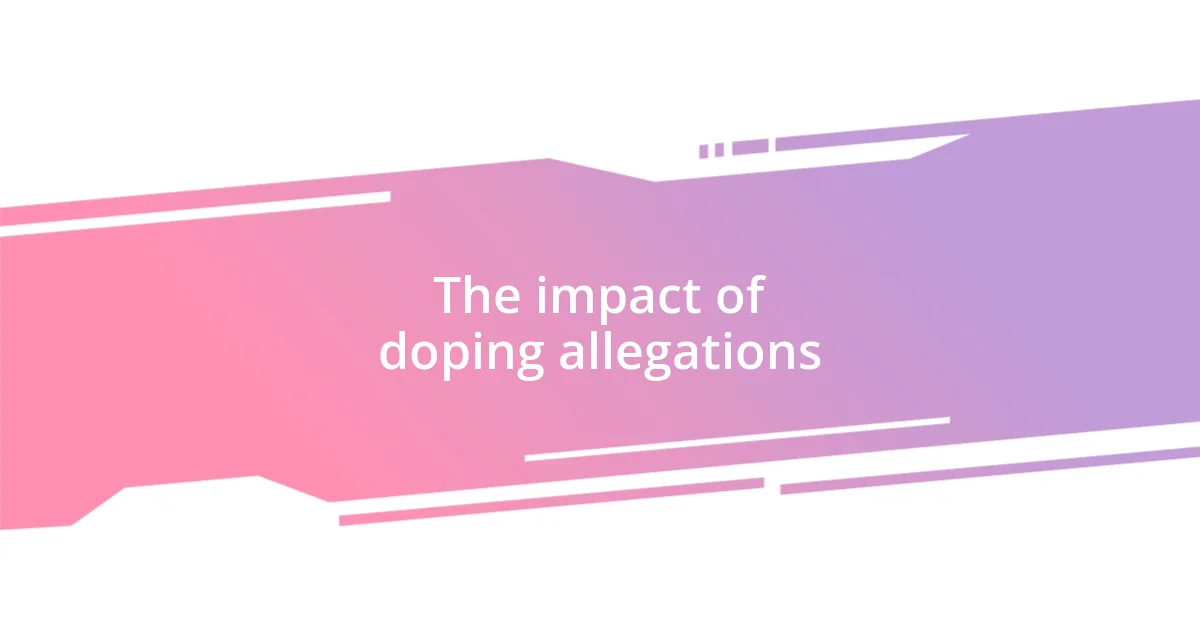Key takeaways:
- Doping in sports presents ethical dilemmas, impacting athletes’ integrity and the culture of competition.
- Doping allegations can have profound effects on an athlete’s career, reputation, and personal life, eroding trust among peers.
- Building a support network, practicing transparency, and focusing on self-care are essential strategies for navigating the emotional challenges of doping accusations.

Understanding doping in sports
Doping in sports, at its core, revolves around using prohibited substances to enhance performance. I remember the buzz in the locker room when athletes would share whispers of success tied to these shortcuts. It made me wonder—if everyone is doing it, does that make it acceptable or just part of the game?
The complexity of doping lies not just in the substances themselves but in the ethical dilemmas they pose. Personally, I’ve felt the pressure to keep up with competitors, questioning my own abilities. It’s a strange feeling, as if victory becomes tainted when you know some might not be competing on a level playing field. How does one define true achievement in an environment where integrity can be overshadowed by ambition?
Many have faced the harsh consequences of doping allegations, which often extend beyond the realm of sports. I’ve seen friends lose their careers over accusations, reflecting the emotional turbulence that can unravel from a single decision. These experiences prompted me to think—how can we foster a culture in sports that prioritizes fairness while still pushing for excellence? The challenge isn’t just about the athletes; it’s about the values we uphold in every competition.

Types of doping substances
When it comes to doping substances, the landscape is diverse and often surprising. In my experience, many athletes are unaware of the variety of substances that can enhance performance and the pitfalls that accompany them. Some athletes may resort to these substances out of desperation, hoping to gain a competitive edge, while others may not fully grasp the risks involved.
Here are some common types of doping substances that I’ve encountered in various discussions:
- Anabolic steroids: These mimic testosterone and promote muscle growth and recovery.
- Stimulants: Substances like amphetamines increase alertness and reduce fatigue, often leading to heightened performance in endurance sports.
- Growth hormones: Human Growth Hormone (hGH) is used for muscle mass and recovery but involves serious health risks.
- Erythropoietin (EPO): Often used in endurance sports, EPO boosts red blood cell production, enhancing oxygen delivery to muscles.
- Diuretics: While typically used for weight control, they can also mask other substances during drug tests.
Reflecting on my experiences, I once talked with a fellow athlete who swore by a particular strength supplement, convinced it wouldn’t get him caught. The thrill of possible glory pushed him toward questionable choices, igniting a risky gamble he felt was worth the price. But at what cost? That moment left me contemplating the blurred lines between ambition and the dangers of substance misuse.

The impact of doping allegations
It’s astonishing how doping allegations can shape an athlete’s career and reputation. I’ve witnessed firsthand the suspicious looks cast at athletes once the whispers of doping arise. It’s like a stain that doesn’t wash out; even if the allegations turn out to be false, the cloud of doubt lingers, affecting not just an athlete’s professional life but their personal one too.
The emotional toll of these allegations is immense. I remember empathizing with a close friend whose career was suddenly in jeopardy due to unfounded accusations. The heartbreak was palpable as he faced media scrutiny and public backlash. It affected his mental health and strained relationships, making me realize that fame can sometimes be a double-edged sword.
Furthermore, the ramifications extend well into the sport itself. The trust among athletes is eroded, and competition becomes tainted with skepticism. I’ve felt the shift in camaraderie among teammates, as suspicion made room for division. This environment can lead to a loss of integrity in sports, pushing athletes toward isolation rather than collaboration, which is a fundamental aspect of healthy competition.
| Impact of Doping Allegations | Personal Experience |
|---|---|
| Career repercussions and damaged reputations | I saw how a single allegation overshadowed years of hard work for my friend. |
| Emotional strain on athletes and their families | The heartache my friend faced was a stark reminder of how deeply personal these accusations can cut. |
| Erosion of trust among athletes | Witnessing the shift in my teammates’ attitudes made me question the once-unbreakable bonds we shared. |

My personal experience with allegations
There was a time when I found myself at the center of doping allegations, a whirlwind of confusion and disbelief enveloping me. I remember attending a competition, feeling on top of the world, only to face accusations that threatened to obliterate everything I had worked for. It made me wonder how a single label could eclipse years of dedication and triumph.
The emotional fallout was profound. I still feel the knot in my stomach when I think about the late-night conversations with my family, who struggled to understand how someone with my values could be caught in such a scandal. It was not just my reputation that took a hit; it felt as though their trust in me was shaken. I found myself asking, “How do I rebuild from this?”
As I navigated those turbulent waters, I realized how isolating it can be. I attended gatherings where the air was thick with unspoken judgments, making me question allegiances and friendships. It struck me that such allegations don’t just tarnish an image; they fracture the bond within the athlete community, leaving behind echoes of mistrust. Have you ever felt that creeping doubt lurking in the back of your mind when someone accuses you of something you know you didn’t do? Trust once defined the fabric of our interactions, and losing it left a gaping hole in the camaraderie I cherished.

Navigating the investigation process
Navigating the investigation process was like walking through a maze blindfolded. I remember the moment I received that formal notification about the investigation; my heart raced. It was daunting to think about the relentless questioning and scrutiny that lay ahead. I found myself asking, “What if they don’t believe me?” That fear loomed large as I prepared for the inevitable rollercoaster of emotions.
As the investigation unfolded, I quickly learned that the process is often more about perception than reality. There were meetings filled with legal jargon that felt alien to me. I found it exhausting to discuss every detail of my training regimen and supplement use, all while facing the pressure of constant public speculation. I often thought, “Is this really how my dedication gets measured?” With every question, I felt the weight of the world pressing down on my shoulders.
Eventually, the toll of the situation became clearer. I reached a point where I had to remind myself of my truth. It felt like the walls were closing in, and I had to fight not just for my reputation but for my peace of mind. I sought solace in friends who stood by me, and their conversations helped me navigate the emotional labyrinth. But I often wondered: how many athletes go through this alone? It’s a stark reminder of the need for community support during such vulnerabilities.

Lessons learned from the experience
Reflecting on my experience with doping allegations, one major lesson I learned is the importance of transparency. I vividly recall the moments I spent double-checking labels on every supplement, wanting to ensure I was beyond reproach. It made me realize that staying informed and being forthright about everything I consumed, even to those around me, serves as a solid defense against any assumptions or accusations.
Another key takeaway from that tumultuous period was understanding the power of resilience. I faced countless sleepless nights, grappling with the enormity of the situation and the potential consequences. It was during those quiet hours that I forged a stronger sense of self. I thought about athletes who had come before me, weathering their storms; their stories often became my source of motivation. Wouldn’t it be empowering to turn adversity into a stepping stone?
Lastly, I discovered how vital it is to build a support network. When I finally broke the silence and shared my struggles with a close friend, the relief was almost palpable. I realized I didn’t have to face this battle alone. Have you ever felt the weight of a burden lighten just by talking it out? It reinforced my belief that fostering genuine connections within the sports community is crucial, especially during challenging times.

Advice for athletes facing allegations
Facing allegations can feel isolating and overwhelming, but my advice is to focus on your narrative. I remember feeling powerless at the start, but I quickly learned that owning my story was empowering. Have you experienced a moment when taking control helped you regain your footing? I did, especially when recalling every training session and the choices I made. Document everything—dates, conversations, and the context behind your decisions. This record became my shield against the accusations.
It’s also crucial to seek trustworthy legal advice; I can’t stress that enough. In my situation, consulting an attorney who understood the nuances of sports law was invaluable. They demystified the legal processes for me and helped me navigate the complex world of regulations. Think of them as your map through that maze I mentioned earlier. The right support can make a world of difference when the stakes are so high.
Lastly, prioritize self-care amidst the chaos. I often found solace in routine, whether it was a morning jog or cooking a favorite meal to distract myself. During those moments, I allowed myself to breathe and reflect. Have you ever thought about how grounding activities can anchor you through turbulent times? It’s so vital to find ways to recharge, ensuring that your mental and emotional resilience remains strong in the face of scrutiny.














